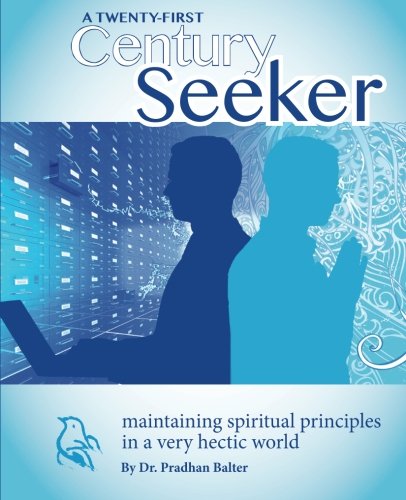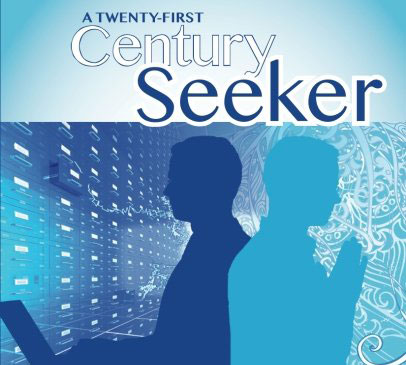Dr Pradhan Balter has published a new book title ‘A Twenty-First Century Seeker’ – maintaining spiritual principles in a very hectic world. It aims to provide a simple and effective guide for seekers who wish to develop their meditation and follow a spiritual life.
 Pradhan has been giving meditation classes for over 40 years. This book seeks to convey the most important principles and useful tips that he has learned from being a student of Sri Chinmoy and reflects his own experience of giving classes. The book stands as a practical manual and reference point for those seeking to discovery more about their inner self. The book, divided into different chapters, contains advice, exercises, and quotes from spiritual Teachers. Pradhan also suggests that seekers create an “inner mission statement†and commit to lifestyle that allows the seeker to fulfill that mission.
Pradhan has been giving meditation classes for over 40 years. This book seeks to convey the most important principles and useful tips that he has learned from being a student of Sri Chinmoy and reflects his own experience of giving classes. The book stands as a practical manual and reference point for those seeking to discovery more about their inner self. The book, divided into different chapters, contains advice, exercises, and quotes from spiritual Teachers. Pradhan also suggests that seekers create an “inner mission statement†and commit to lifestyle that allows the seeker to fulfill that mission.
I recently spoke to Pradhan about how he came to write the book. He says about 17 years ago, someone who was very inspired by his classes transcribed word-for-word 4 days of classes. She then handed the transcription over to Pradhan saying, “Here! You have to write a book.†Moved by the dedication it required to do the transcription, Pradhan asked his spiritual Teacher if it was a good idea. Sri Chinmoy responded with an enthusiastic “Do it! Do it!†Upon reviewing the transcription, Pradhan noted that the spoken word doesn’t always transcribe so well. He explained, “In a class, I could change the meaning of what I was saying with a gesture or change in intonation. You don’t have that luxury with the written word. You have to be much more precise.†So Pradhan spent 17 years refining and adding to the book. The following are extracts from an interview with Pradhan.
Qu: What was the aim of the book.
Pradhan: The book is a culmination of different talks I have offered to seekers on different aspects of the spiritual life as I have understood them from my spiritual Teacher Sri Chinmoy. I wanted to present these in an organized and accessible way. It can serve as a step-by-step guidebook for a seeker who wants to learn and understand meditation, but can also serve a guide for someone who wants to offer meditation classes themselves.
Qu. What is the most important thing for a beginner to meditation?
Pradhan: The key to meditation is appropriate aspiration. This is our hunger for something higher. And so I begin by simply asking the reader to consider what really gives their life meaning. If they could “paint themselves perfectlyâ€, how would they choose to be? I have asked this question to literally thousands of seekers and it is quite revealing that the answers are always this incredible list of inner qualities: being more peaceful, self-giving, forgiving, loving, etc. Believe it or not, only once or twice has someone answered “outer successâ€. This question and the collective answers forms the framework for the remainder of the book.
Qu. What makes a good class giver?
Pradhan: When teaching meditation, there are 2 aspects to a class: an outer aspect, that is, the content but an even more important inner aspect. For example, someone can give a very polished class, well organized, thought out but if there is no inner conviction then the class has no inner authority. On the other hand, a class can be all devotion but somewhat devoid of outer content. I think this has merit as well because students will feel the devotion of the teacher. If you have both, then that is the best.
As a teacher, I think its very important to practice what is called “empathic listening.†When a question is asked, really listen. This is something I had to learn as well. Most people formulate an answer to a question even before the question is fully asked! Better to wait, give full attention to the asker, and let the question percolate a little inwardly before offering an answer!
Qu. What have you learned from giving meditation classes?
Pradhan: Giving classes has played a major role in my spiritual life. Being constantly placed in front of new and fresh aspiration is such a benefit. When you give a class, you are compelled to be in a good consciousness because you are speaking on behalf of the soul/aspiration of the seeker. For me, the moment I step in front of a group, I feel the necessity of representing Guru (Sri Chinmoy), and it compels me to be in a better consciousness. I ALWAYS have wonderful meditations in classes, and this is an experience that many other teachers have had as well.
Qu. What was the experience of writing the book?
Pradhan: It helped to solidify my own inner experience. Like a spiritual diary, writing can renew your own inner experiences. Even if you don’t plan to teach a class, I encourage everyone to write down their spiritual experiences. You can then always go back to it for inspiration.
Qu. In the past 42 years what were some of your most memorable moments in the spiritual life, apart from giving meditation classes?
Pradhan: With my own Teacher Sri Chinmoy, I received the most wonderful blessings on every end of the spiritual life spectrum. On the one hand, I can always invoke the feeling of sitting with Guru, and he would just place his foot on my lap. As I sit here recollecting that, I get inwardly choked up. How did I get that role? On the other end of the spectrum, this outer closeness also came with a special kind of blessing: Guru’s scoldings! I was fortunate to have a close outer relationship with Guru. Scolding compelled me to look within, deeper, longer and more profoundly than anything else. Nothing compelled me to change more than one of these special blessings.
Guru was living embodiment of his teachings and transcendence was the corner-stone of these teachings. Guru was a driving force and always encouraging us out of our comfort zones into something bigger, requiring greater capacity. Guru would push you into transcendence. Complacency wasn’t acceptable. (In Pradhan’s other book,- ‘At The Feet of My Master‘ there is an entire chapter dedicated to his scoldings. Sri Chinmoy affectionately told Pradhan that this was his favorite chapter!)
Buy Book
- A Twenty-First Century Seeker by Pradhan Balter at Amazon.com
- Also, you can contact Pradhan directly, if you wish to buy more than 6 copies.
Related
- Interview with Pradhan Balter at Sri Chinmoy TV
